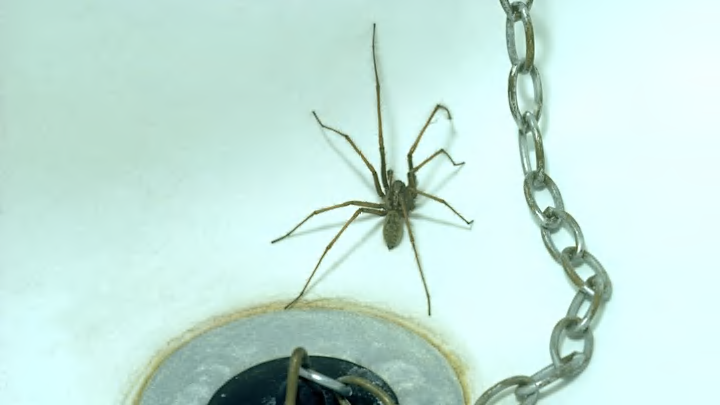Even if you’re not a full-blown arachnophobe, your reaction to spotting a spider skittering across your floor is probably some combination of shrieking and whacking it with the nearest shoe. Next time, you should just take a deep breath, tip your hat, and let the eight-legged critter continue on its merry way.
Though you might prefer to believe that spiders rarely find their way into your immaculately clean home, that’s almost definitely not the case. In an article for The Conversation, entomologist Matt Bertone and his colleagues at North Carolina State University surveyed 50 North Carolina homes and found spiders in every single one. The truth is, Bertone says, spiders are important to our indoor ecosystems. Since they’re generalist predators, they’ll pretty much eat anything, from the dead fly on your window sill to the mosquito that had planned to make a midnight snack out of your face. Sometimes, they’ll even eat other spiders. So whether a spider is just passing through your house or has taken up permanent residence in the upper corner of your closet, it’s definitely working for room and board.
Also, the spiders in your house likely aren’t the terrifyingly huge, mammal-devouring specimens that make great headlines. In their inventory, Bertone and his team primarily found common house spiders, like harmless cobweb spiders and cellar spiders. While most spiders are venomous, their venom often isn’t strong enough to affect you, and their fangs are often too small to pierce your skin. And if you shudder at the thought of spiders crawling over you when you’re sleeping, keep in mind that’s not likely, either—our snoring, rustling, and even plain breathing are enough to keep them from investigating further.
So remember, just because you can’t see the spiders in your home doesn’t mean they’re not there, and besides, they’re working hard to make your home an insect-free habitat for you. If you still can’t bring yourself to let one scurry away to who-knows-where, consider releasing it outside, where it can secure the perimeter from disease-carrying pests.
Discover More Spider Facts:
A version of this story was published in 2019; it has been updated for 2025.
